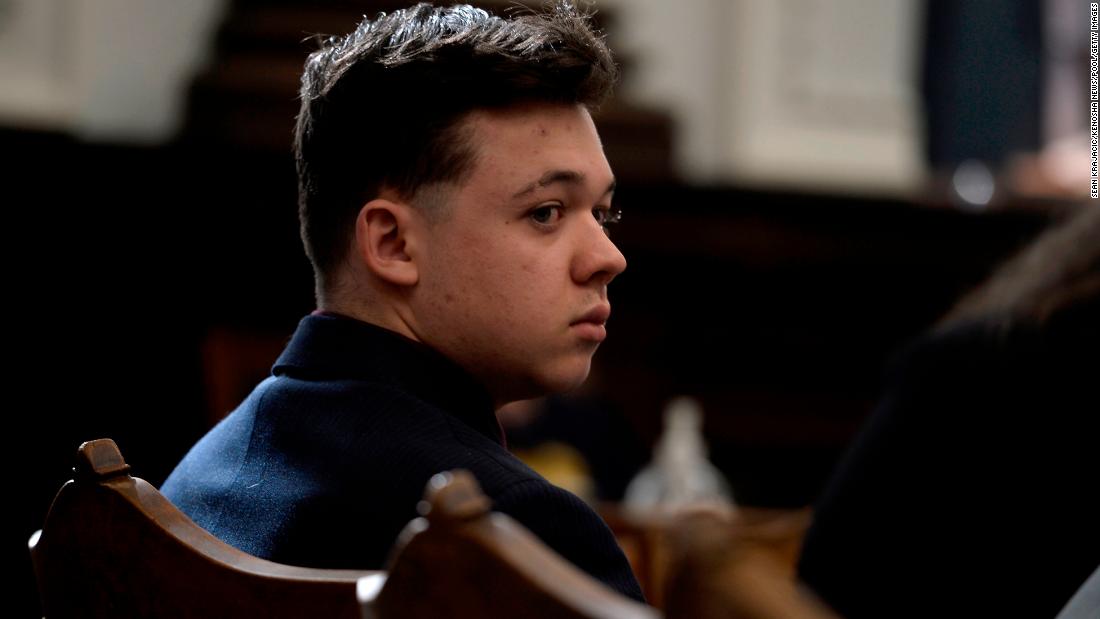Rittenhouse’s testimony is likely to be pivotal
“I didn’t do anything wrong. I defended myself,” he testified.
Rittenhouse testified under cross-examination that he shot at four people in all that night during his attempts to defend himself.
“I didn’t know if it was going to kill them but I used deadly force to stop the threat that was attacking me,” he said.
Rittenhouse is the defense’s seventh witness and is crucial to the defense’s argument that he acted in self-defense on the night of August 25, 2020, when he killed two people and wounded another. The prosecution has instead sought to show Rittenhouse illegally possessed the gun and acted criminally and recklessly.
His testimony has led to heated exchanges among the attorneys and judge in the case. Twice during cross-examination, Judge Bruce Schroeder asked the jury to leave the room and then sharply admonished prosecutor Thomas Binger for his line of questioning.
Rittenhouse’s defense attorneys asked the judge to issue a mistrial with prejudice for the incidents. The judge said he would take the motion under advisement.
Rittenhouse pleaded not guilty to six charges, including first-degree intentional homicide, first-degree reckless homicide and first-degree attempted intentional homicide. Judge Schroeder dismissed curfew violation charge on Tuesday, saying prosecutors had failed to present evidence to support it.
Rittenhouse lays out the night of the shootings
Rittenhouse began his testimony Wednesday by telling jurors he is now studying nursing at Arizona State University. He testified that he had worked as a lifeguard in Kenosha, was part of a police explorer program and knows CPR and basic life support.
He lived in Antioch, Illinois, with his mother, and his father lived in Kenosha. He testified that he went into Kenosha on the morning of August 25 to clean up graffiti, and then again that night with a rifle and small medic kit and joined up with a group of armed people. “I went down there to provide first aid,” he said. He said he did not go there looking for trouble.
Rittenhouse told jurors that Rosenbaum threatened to kill him twice that night. In one instance, Rosenbaum screamed, “if I catch any of you f***ers alone, I’ll f***ing kill you,” according to Rittenhouse.
At one point in the night, he became separated from the other armed people in his group. He walked toward a parking lot and said Rosenbaum, hiding behind a vehicle, “ambushed me.” Rosenbaum began running at him and cornered him, he said.
In court, as he tried to explain what happened next, Rittenhouse became choked up and broke down into tears, leading the judge called a short break in the trial. Rittenhouse resumed his testimony shortly afterward.
Seconds after that gunshot, Rittenhouse turned and saw Rosenbaum, 36, coming at him with his arms out front, he said. “I remember his hand on the barrel of my gun,” Rittenhouse testified. He then shot Rosenbaum four times, killing him.
Rittenhouse then tried to run down the street to where police were situated to turn himself in, he testified, but a “mob was chasing me.” While running, he became lightheaded and fell to the ground, he said.
An unknown person jumped at him trying to kick him, and Rittenhouse fired at the person twice. “I thought if I were to be knocked out, he would have stomped my face in if I didn’t fire.”
Anthony Huber, 26, then came at him, struck him with a skateboard, and grabbed his gun, he testified. Rittenhouse shot him once, killing him. Finally, he saw Gaige Grosskreutz lunge at him and point a pistol at his head, so Rittenhouse shot him, he testified. Grosskreutz was wounded.
Judge criticizes prosecution for line of questioning
On cross-examination from Assistant District Attorney Binger, Rittenhouse acknowledged he used deadly force in shooting the men.
“I intended to stop the people who were attacking me,” Rittenhouse said.
Binger’s line of questioning twice led to criticisms from Judge Schroeder. The first incident related to Binger’s questions about Rittenhouse’s post-arrest silence, a right solidified in the Fifth Amendment of the US Constitution.
“The problem is this is a grave constitutional violation for you to talk about the defendant’s silence,” Schroeder said. “You’re right on the borderline, and you may be over, but it better stop.”
The second admonishment related to questions about an incident two weeks before the shootings that Schroeder has said would not be permitted to come into evidence. Binger said he believed that incident was newly relevant to the case, but Schroeder criticized him for not asking permission first and affirmed the evidence would not be allowed.
“Don’t get brazen with me,” Schroeder said. “You know very well that an attorney can’t go into these types of areas when the judge has already ruled without asking outside the presence of the jury to do so, so don’t give me that.”
Armed paramedic never said he regretted not killing Rittenhouse, friend testifies
But under oath in court on Wednesday, Marshall testified that he had made up those words and that Grosskreutz had not actually said that.
“I lied. He never said that,” Marshall testified. “100% made it all up.”
He did so “out of pure anger” and in an attempt to stick up for his friend, he said.
![]()


